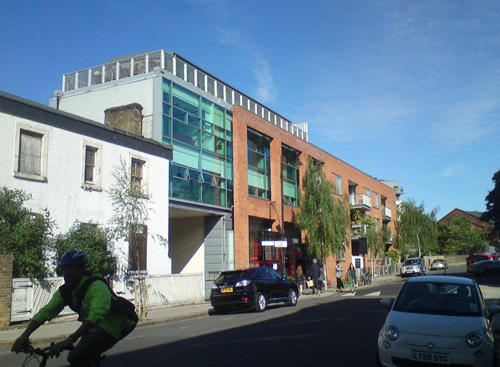Bell Labs: Improv Will Eat Itself
June 2013

"In place of the LMC, a tony Italian restaurant." Former home of the London Musician's Collective, 42 Gloucester Avenue, as it stands today. Photo by Clive Bell
“Fear of change perplexes monarchs,” wrote Milton in Paradise Lost. All very well, but commoners like myself can also get upset when a favourite venue or shop disappears. For almost a decade, Mark Wastell’s Sound 323 shop on North London’s Archway Road was a landmark for experimental music fans, offering not only records but amiable, informed chat about those records from the proprietor. Stood behind the counter was a key mover in the UK improvised music scene, concert promoter, member of groups like The Sealed Knot and IST, and founder of the Confront label.
Saturday afternoons saw the shop and its basement cellar thronged for informal concerts and album launches. Today the space is an empty shell. A sticker in the window proclaims, “Attention: 24 hour recording in progress!” But those are recordings not scheduled for release.
Sound 323 went the way of many independent record shops, and Wastell made a sideways move, pausing his music and opening a grocer’s-cum-café in Winchmore Hill, named The Larder.
Wastell’s retail skills are in no way diminished, and I left The Larder laden with fig jam, duck paté and an artisanal loaf, plus a new release by The Sealed Knot.
Unusually for a musician, Wastell has spent most of his life in retail, starting with a six year stint as a greengrocer after leaving school. “Look, retail is retail, whether it’s a cup of coffee or an Eliane Radigue CD,” he points out. Shortly after opening, he found himself delivering multiple cases of wine to a nearby mansion, where US rapper Will.i.am was in temporary residence while recording The Voice for the BBC. There’s probably no connection between this encounter and Wastell’s subsequent decision to revive his label and recommence performing.
Wastell’s shuffle from music into food is an intriguing move. Is there a pattern here? Take the old London Musicians Collective building at 42 Gloucester Avenue, Camden Town.
Up a decaying metal staircase, above a laundry, lurked a pair of large, grimy open spaces, formerly canteens for British Rail workers. From 1975 onwards, the LMC and the London Film Makers Coop took up residence. Thousands of concerts later, British Rail demanded the building back, demolished it and sold off the valuable canal-view site. A glamorous apartment block arose – salmon-pink brick, green-tinted glass and tumbling plantlife – and, in place of the LMC, a tony Italian restaurant, Sardo Canale. I had to eat there, to see if LMC ghosts were hovering. The pasta was excellent, if over-priced; a pasta of the present moment, unhaunted by the past. I told the waiter some of my memories of the building, and watched his eyes glaze over. He too was stuck in the present.
But London moves on remorselessly, and now even Sardo Canale is gone, replaced by “Michael Nadra Primrose Hill”.
Maybe the LMC’s spirit of fearless experiment lingers yet. According to a recent review, “Nadra is not afraid of a big flavour.”
And what of The Engineer opposite? The gloomy, crepuscular pub, where Steve Beresford debated music’s political dimension with members of Scritti Politti, alongside permanently disgruntled locals. This became, for many years, a supremely successful gastropub, under the management of Lawrence Olivier’s daughter. I ate there several times – the chilli prawns are a happy memory – in the garden! Who knew the place had a garden? In my day that was a wet yard by the gents, where it was always raining. This erstwhile rough old patch of Camden, defined by railway and canal, is now an upscale outpost of fragrant Primrose Hill. For neighbours the ghost of the LMC has The Primrose Bakery – a cupcake café with a charming bench outside – and that ultimate signifier of bon ton location, a fishmonger: La Petite Poissonerie, with sushi specials written in Japanese. Can this be the same street where Paul Burwell’s Bow Gamelan terrorised their audience with barely controlled pyrotechnics? I’m not saying I anticipated the flow with the title of my 1997 solo album.
So it goes: music evaporates, and food takes over. It must be a UK cultural shift – the whole nation has gone from being crazy about music to being obsessed with food. Bye bye Ready Steady Go!, hello Masterchef.
And look at The Spitz, formerly an ambitious little music venue in Spitalfields market. Now it’s the Androuet cheese shop, its mission "Seasonal Cheese Since 1909". Upstairs is a cheese-themed bistro, affiliated to the Slow Food movement. It’s all too much – a swanky Parisian fromagerie, advocating eco-languidity just metres away from roaring traffic. It’s one more example of the frothy unreality that possesses Spitalfields today, as it abandons market for marketing. Clearly underground music thrives more vigorously in grimier, more mixed areas: 1970s Camden, 2000’s Dalston. Though I gotta say, Androuet’s Special Fondue looks good.